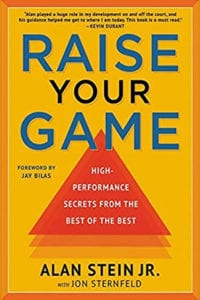Alan Stein Jr., a veteran basketball performance coach and business owner, shares what high-performance athletes teach us about organizational leadership.
Sometimes we find ourselves in roles that are not exactly what we envisioned. But when we learn to fall in love with the output of our work, it drives us even further in a virtuous cycle of high-performance. It is the leader’s responsibility to seek this intersection between passion and performance for themselves and their team and instill the value of collective responsibility into each essential cog in his team machine. If you’re looking to up your team’s game, you’ll love listening to this week’s guest Alan Stein, entrepreneur and a veteran basketball performance coach who has spent over fifteen years working with the highest performing athletes on the planet.
In our interview, Alan shares what we can learn from professional athletes about how to develop winning mindsets and routines. If you want to ignite more passion for work in yourself and your team and motivate collaboration for higher organizational performance, this one is a must-listen!
Listen to the podcast here:
Download the audio file here.
What High Performing Athletes Teach Us About Organizational Leadership With Alan Stein Jr.
Before we dive into our episode, I want to ask you for a quick favor. If you enjoy the show, please head on to iTunes or Google Play and leave a review. What will it do? It will help us get the show in front of more people so more people could enjoy it. Our guest is Alan Stein, a successful business owner and a veteran basketball performance coach. He has spent fifteen years working with the highest performing athletes on the planet. He teaches proven strategies to improve organizational performance, great effective leadership, increase team collaboration, and develop winning mindsets and routines. The strategies from his book Raise Your Game: High-Performance Secrets from the Best of the Best are implemented by corporate teams and sports teams around the country.
It’s my honor to speak to Alan. In our interview, Alan and I discussed what makes a great leader and a great organizational performance. More importantly, Alan explains how you can make sure that leaders and teams are always on the same page when it comes to performance and not typical performance but high performance. Also, we speak about leadership’s passion about what you do. He shares the line that I loved, which is, “Not always you love the work you do, but you always have to love the outcome of your work.” Also, know the ways Alan breaks down what you could learn from athletes and how the commitment to success and how you could apply it to your business. Finally, pay close attention to how Alan speaks about the importance of self-awareness for leaders. If you are self-aware where you need to improve, you are going to improve versus not being self-aware. Without further ado, here is my interview.
—
Alan, thank you much for joining me on the show.
It’s my pleasure. It’s great to connect with you.
I found out about you and I jumped in the opportunity. I made some research. I saw about the book you wrote and the topic, which was intriguing for me and for our audiences as well. When we speak anything about scalability and becoming a better leader and pushing ourselves to performance, that always piques my interest. I right away wanted to know more about you and invited you to the show. Thank you much for taking the time to be here.
We’re going to have fun and hopefully impactful chat.
I want you to share a little bit about your journey. When somebody is a coach and somebody teaches leadership and is excited and passionate about this topic, there’s a story behind it. Go for it. Share some of your backstory.
[bctt tweet=”What are you passionate about? What are you good at? Find out where those two things intersect. That is your strength zone.” via=”no”]
The CliffsNotes version is basketball was my first identifiable passion. I fell in love with the game at 4 or 5 years old and here a few decades later, basketball is still a major pillar in my life. When I was done my playing career at the end of college in the late ‘90s, I knew that I still wanted to stay involved in the sport. In college, I had started to develop an equal love for performance training, strength and conditioning, and fitness. When I graduated, I decided that I would marry my original love of the sport of basketball with my new love of performance training and strength and conditioning. I became a basketball performance coach. I did that for almost twenty years until I made the distinct pivot to leave the basketball training space and become a keynote speaker and author. I now teach businesses, leaders and executives how to utilize the same strategies and mindsets in business that elite athletes use to perform at a world-class level. Basketball is still involved in what I’m doing, but it’s much more focused and centered on people in the business world and people looking to scale, drive, improve their business, their culture and their leadership.
We did have people that in the past on the show that came from a similar background. I speak to business owners and they’re wearing out. They’re getting frustrated and they’re not moving forward as their vision was at the beginning when they were all excited about building their company. I think where I want to go with this conversation is what you see the mindset of an athlete. Sometimes from an early age, you could go back to some of those histories where those young kids starting and having that vision of what they want to be and not giving up. What could you share for our business leaders out there, the practical tips? What the mindset and how they’re high performance in the early ages and the early stages of their career are beneficial in how they’re growing long-term?
One of the best pieces of advice that I ever received as a youngster was to find what it is that you love to do. Find what you’re passionate about and then find what it is that you’re good at, where your natural talents lie. And then find where those two things intersect. Where those two things intersect, that’s going to be your strength zone. You want to spend as much time in your strength zone as possible because that will enable you to perform at a high level, and achieve success and significance. It’s also where you’ll be happiest and most fulfilled. That’s important with the point that you brought up about trying to avoid burnout, dealing with day-to-day stress and stagnation. The key is to constantly figure out where that point of intersection is. Find what you love and then find what you’re good at.
Many times, in the business world, we may fall out of love with what we’re doing, but you can reconnect by falling in love with the result of what you’re doing. A perfect example is to be an elite athlete. You don’t have to love working out, but you have to love the result you get from working out, which is running faster, jumping higher, being stronger, or what have you. You may not love your exact day-to-day, but you love what it is that you produce. You love leading other people or you love the product or service that you’ve created. It’s always important to reconnect.
Simon Sinek talks all the time about finding your why, and that’s what you need to do is continue to find what makes you passionate. Equally important is also making sure that you stay in the lane that utilizes your talents to the best of your ability. That we all are happier, more confident and more fulfilled when we do things that we’re good at because there will be more enjoyment in that. Sometimes when you’ve been in business for a while, you veer off of that path and you find that your day-to-day is bogged down with a bunch of tasks that you don’t love and you’re not good at. That’s where a lot of the times we can extinguish the flame that we had before. Do everything you can to make the necessary pivots and tweaks to stay in that strength zone.
I loved what I heard from you, which is sometimes you don’t love the work, but you love the outcome. A lot of people have asked me in my career like, “Where did I get to do what I’m doing from the education side?” In our agency, Ptex Group, that we help many growing businesses get to the next level with branding and marketing services. I always reminded myself that in the early stages, I said, “If I do something, I want to make a larger impact. When I’m doing an action, the result from that, the outcome of that, there’s a happier business owner or a business owner that’s thriving because of the action we have done,” that was fulfilling to me.
Taking that into account, I’m now realizing based on what you said that there are so many hard days. Every business owner, nobody’s exempt from hard-working days. Covering the bank, making large decisions, hiring, or whatever it is. Sometimes those hard work, you get frustrated about it, but you constantly have to come back to that outcome. For our audiences, take this one sentence that we said, and let it sink in. “You don’t always love what you do, but you love the outcome of what you do.” Thank you for that.

This is something I’ve had to come to terms with during the COVID-19 pandemic. By trade, I’m a keynote speaker. I’m a professional speaker and I haven’t been able to be on stage for the past several weeks. I most likely won’t be on another stage at least for several weeks. It reminded me of something else that is congruent with this topic. Hopefully, your audiences find value in and that is speaking is what I do, it’s not who I am. There’s a difference between the two. At my core, I am a coach. I am a teacher. I’m someone that likes to help people make improvements to their performance. People that increase their achievements. I want to help people go after their dreams. That’s who I am at my core. Speaking happens to be a platform at which I do that.
I’ve had to recalibrate and say, “My goal is to fill other people’s buckets and help other people get where they want to go. If I can’t do that by being on stage at an in-person event, what are some other ways that I can do that?” Being on a show like this is one way, I’ve been doing tons of virtual sessions with Zoom calls, writing a blog, and posting on social. There are other ways that I can still do what it is that lights me up and gets me excited and connects me with who I am. That’s another thing to think about with this whole connection to your why and what you love. Don’t forget who you are at your core and what your primary mission and vision are and stay connected to that.
Let’s speak a little bit about organizational performance. This is what you teach and this is what you speak about. What are the biggest challenges you see business leaders face when it comes to organizational performance?
One of the big ones is lack of role clarity that everyone on the team doesn’t know exactly what their role is and what’s the expectation at which they’re supposed to perform their role. That kind of foggy, ambiguous feeling can be a demotivator. It’s so important that everybody on the team must know what their role is, embraces their role, and then does everything they can to star in their role. They have to acknowledge that the role they have on the team is not always what they want it to be, but it’s often what the team needs it to be for the team to be successful. The key is making sure that everyone else on the team appreciates respect and values that person’s contribution. You have to constantly let your team members know where they fit into the bigger pie.
If you’re a solo puzzle piece laying on a table, you probably don’t have a tremendous amount of value when you look at yourself. When you realize that you are a puzzle piece, that’s needed to complete the full jigsaw puzzle to have this beautiful mosaic picture at the end, then you realize that what you’re doing is important. People always need to feel valued and feel important. Lots of times roles are unclear. A perfect example would be, let’s say that I work for you and I report directly to you. Someone has me write down what I believe my role is and my job and my responsibilities. They ask you to separately, write down what you think my roles and responsibilities are, and then we compare the two sets of notes. It’s humbling that what you think I’m supposed to be doing every day is slightly different than what I’m supposed to be doing every day.
You can see how that would lead to some dysfunction, to some miscommunication, to even some frustration that you’re probably banging your head against the desk going, “Why isn’t Alan doing this?” I don’t even know that that’s what I’m supposed to be doing. I’m over here working like a dog on something else and I’m thinking, “Why isn’t Meny appreciating what it is that I’m doing?” It’s all because we lacked role clarity. The last thing I’ll say on that is it’s also important to be clear with our expectations. I have three young children. If at the end of dinner, if I tell my son, Luke, who’s ten years old, I say, “Buddy, I need you to clean the table.” Whose definition of clean do you think he’s going to use, his definition of clean or my definition of clean?
He’s going to use his definition. I’ll tell you when you’re ten years old, your definition is he takes the plates. He sets them in the sink and then he runs to grab his iPad. That’s not my definition of clean. My definition of clean would be you rinse off each dish and utensil. You put them in the dishwasher and then you get a rag and you wipe down the table. If you knocked a bunch of crumbs on the ground, then you grab a vacuum and you vacuum it up. That’s my definition of clean, but it’s not fair for me to get upset with him unless I specifically told him what it was that I expected. If I didn’t define what clean means, then that’s my fault as the leader. That’s not his fault. He’s going to default to what he believes it is. Lack of clarity on expectations falls right in line with a lack of role clarity.
[bctt tweet=”You may fall out of love with what you’re doing, but you can reconnect by falling in love with the result of what you’re doing.” via=”no”]
I always say that we have a Leaders Forum that we teach leaders as well. One of the first things in the program we do is we come up with what is an important role for a leader and it’s clarity. What’s more important than clarity is casting that clarity to the team. Many times, that the leader arrives at a certain level of clarity, it lacks the casting of clarity to the team. Now their expectations, your expectations are different, or your vision of something in the role is different than what they think about. What you shared, the practical advice of having to compare notes on what the role is. It’s brilliant because that’s the first level of, “Let’s see how off we are.”
Maybe we’re slightly off. Maybe we’re totally off. It reminds me of a story. I once spoke to a person that was a key employee in a larger company. He told me that he’s moving on and he’s not happy. I asked him, “What would your boss feel once you leave?” He says, “He’s going to be all over the place. He won’t be able to manage what I need because I’m doing everything.” I asked him, “Could I have a call?” I knew the owner of the company. “Could I have a conversation?” I spoke to that owner and he told me, “If he came to you for advice, if he should leave, please advise him to leave.” I was thinking to myself, “How could it be off the person thinking that the company cannot survive without him and the business owners think, ‘I wish he moves on?’” A lot of it comes down to busyness instead of effectiveness.
The person being busy and they think this is their role. This is how the company values what they’re bringing to the table. The business owner is saying he’s doing everything, but what I hired him to do. It reminded me of that story for our audiences on understanding how important organizational performance is. If the expectations are not in sync, then everything else follows that. The everyday work, the delegation, the progress, everything follows what expectations do you have.
Another point that I’ve seen, which is when this happens, even if the expectations are not clear, you could have a solid conversation about it. It’s not blurred. Tell me more about how does a business owner go about getting that organization performance in sync? What would be those steps? Somebody who’s tuned in to this show and saying, “I’m that business owner, I know my people are not synced up.” What would the first few steps be that you would give for the readers?
One of the biggest mistakes they make is they overcomplicate things. Life, basketball, or business, are much simpler than we make them out to be. I know this is harder if you have many direct reports. I realized that if you have a company with 50,000 people, this would be more challenging than if you had a company with 50 people. Constant recalibration and being able to say, “We’re going to sit down, whatever it is once a month, once a quarter, once every six months,” whatever you think it may be, and say, “We’re going to have one-on-one and we’re going to check in with each other. I’m going to refocus my lens and tell you exactly what it is that I need from you, why you are important to this team and why your work matters and the expectations that I have for you.
During that same chat, I want you to be able to share the same things. Is this congruent with what you believe your roles and responsibilities are? Do you feel like we’re utilizing you to the best of your ability? Do you have some talents that we’re not taking advantage of? Do you have a secret weapon that we’re not using and do you understand, agree and accept these expectations?” It’s not necessarily a one-way conversation. It needs to be a dance between the two people. If you do these often enough, they don’t have to be these lengthy discussions. I’m not a huge fan of the annual one-time review.
Even if you sat down for fifteen minutes, once a month with each person on your team to say, “Let’s make sure we’re on the same page. What are you working on? What do you need my help with? What resources could I provide to make this easier for you?” You have this constant dialogue. Anytime something does get a little bit foggy or off track, it’s quickly corrected. That’s what would be the starting point that if anyone reading to this, you have any doubt that everyone on your team is crystal clear on all of the above, then make time to sit with them.

If you do have an organization with 50,000 people in it, clearly you, as the leader, can’t sit down with all of them, but you have systems in place that say, “Each manager, director, or supervisor is responsible for X number of people. It’s my job to train them. It’s their job to train the people that report to them so that way we can scale.” Constant check-ins are important. Lots of times leaders say to themselves, “I don’t have time for that extra work.” My retort is, “That is not extra work. That is the work. That is your job as a leader. All of the busy stuff you’ve been doing, that’s the extra work. Nothing is more important than making sure your people feel valued and appreciated and make sure that they know their role, embrace their role and are starring in their role.”
I always say that when a business leader and a team ask themselves, “Am I doing the important stuff?” Ask yourself one simple question, if you don’t do the work, could somebody else do it for you? Most of the work that a leader needs to do, nobody else in the organization will do it for them. They’ve got to be focusing on the stuff which means clarity, leadership, moving the needle forward and having those conversations. You’re teaching a lot of what you learned in sports. I’ll try to use those world-class training for business owners and organizational performance. There’s another aspect other than leadership, which is like sports. Every company is a team of people or players. They have to work together in order to produce great results. What are some key ideas you could share about promoting team collaboration in the workforce?
It all starts with accountability and in line with expectations is setting standards. You need to get crystal clear on the standards of your organization. What is the code at which each of us will live by that if we uphold this code collectively, we’ll be the best company that we can be? You need to get everyone to buy in and to believe in a system of collective accountability. It’s important that you reframe this so that everyone on your team knows that holding someone accountable is not something you do to them. It’s something you do for them. That when you hold someone accountable, that’s the best gift that you can give them. Basically, you are saying, “I care much about you and I care much about our team that I’m not going to let you slide. I’m not going to let you get away with doing less than you’re capable of. I’m not going to let you get away with having a bad attitude. I’m not going to let you get away with not fulfilling your role.”
We need to make sure that accountability is not something that’s feared or resisted, but it’s something that’s embraced. Once you’ve got great clarity, these are the standards. If everyone on our team lives up to these standards, every single day, we give ourselves the best chance of being successful. Anytime someone on our team steps out of bounds or undermines or violates one of those standards, we’re going to call them out and we’re going to hold them accountable. We’re going to do it with compassion and love and grace, but we’re going to hold it accountable because as soon as someone violates one of our standards, they give the rest of us less of a chance to be successful and we simply can’t accept that.
When you can get everyone on the team to acknowledge that, then you’ve got something special. What’s important and this is the next level for businesses is most businesses have what’s called vertical accountability, which is top-down. This means the folks at the top of the org chart tell everyone beneath them what to do and hold them accountable. That’s mediocre at best. What you need to create is a system that also includes horizontal accountability, which means teammates are holding each other accountable. This means you don’t have to wait for the CEO to walk in the room and tell someone they haven’t done something right. Everyone on the team is willing to do that with each other. When you create this web where it doesn’t matter where you fall on the org chart, you have the right and the obligation to hold everyone else accountable, then you’ve got something special and that puts you in an elite class of organizations.
This is something that our audiences will appreciate because I speak a lot about accountability. We call it internally KRAs, Key Results Areas where people have to focus. The way we look at our team members is the three E’s which are Effective, Efficient and the culture of Excellence. Those are the three areas every person has to be able to bring to an organization. This is something that I’m hearing many times from business leaders is, “I have those conversations. I’m giving feedback. I’m seeing improvement a little bit or I’m not seeing improvement because we do want to empower our people. How much effort should a leader put into a team member to see if he or she is doing their job? Is it worthwhile to continue investing this energy or maybe it’s not working out?”
As much as required. I would say don’t ever give up too early. The key is for the leadership to have the humility, vulnerability, extreme ownership, and self-accountability to put the onus on themselves. Many times, it’s easy to cast blame on someone else. This team member doesn’t give a good effort. This team member is selfish. This team member doesn’t care. It’s easy to place blame on them, but if we can switch that around and say, “For some reason, this team member is not performing at the level that I believe they’re capable of and that’s my responsibility as the leader. Somehow, I have not coached them to the excellence that I believe is their potential. How can I change what I’m doing to make this work? How can I communicate in a different way? How can I approach this in a different way?”
[bctt tweet=”Checking in on your team is not extra work. It’s your job as a leader. All the other busy stuff you’re doing, that’s the extra work.” via=”no”]
As long as we continually take it upon ourselves to be responsible for doing that, then I think it’s somewhat subjective to decide when is enough, enough? When do I decide that, “It’s not worth taking any more time or effort into this person?” If you have a process for hiring for the right fit, and most of your interview questions have to do with how coachable someone is, your culture if they’re a good fit, and less on their technical acumen, then there shouldn’t be an issue often. Many of the times that we feel like we’ve got someone on the team that doesn’t fit is because we weren’t strict enough in the way that we were hiring. We rushed a judgment or we didn’t ask the right questions, or we filled out of urgent need instead of finding the right fit.
We let the wrong person on the bus. As leaders, we have to accept responsibility for that. If we’re the ones that invited them on the bus, then it’s our fault that they’re not being able to perform at the level that we need them to. I think the key is always looking in the mirror first before we cast blame on anyone else. Then continuing to problem solve and critically think until you find a way to get through to them. I laugh all the time when I hear a statement to the effect of, “Meny, I’ve told you 100 times…” If you’ve told someone a hundred times and they’re still doing it that way, that’s your fault as the leader. If you’re an effective communicator, you should never have to tell someone something 100 times. You tell them once or twice and then if that doesn’t work, you tell them in a different way. If that doesn’t work, then you show them in a different way. You constantly change your communication. Anyone that says the statement, “I’ve told you this 100 times,” I think it’s the equivalent of holding up a sign that says, “I’m a poor communicator.”
You’re also the author of this bestselling book Raise Your Game: High-Performance Secrets from the Best of the Best. What inspired you to write the book? Maybe you could share a couple of pointers with our audiences from the book.
I wrote the book for three distinct reasons. The first reason is I love books and I have a strong appreciation for authors. I can look back on my career and think of a handful of books that had a profound impact on my life. I thought if I could write a book that could in some way contribute to someone’s development or growth, or could some way help improve their situation or circumstance, that would be a neat thing to do. I chalked that up under a professional bucket list item. The second reason I wrote it was, as I was entering the corporate professional speaking realm, I wanted to get clear on my message and get hyper-organized with all of my content, and writing a book will force you to do that.
Even if I never publish the book or never put it out for anyone else to consume, the act of writing it was incredibly helpful to me getting clear on my speaking message so that was part of it. The third reason was I had spent twenty years in basketball building up some credibility and name and brand recognition. Then I leaped over to the corporate world where at the time I didn’t have any brand recognition. I knew writing a book would help improve credibility that if someone got ahold of the book and they liked what the book had to say, that would make them more likely to bring me in to speak. It was done to build credibility and as a speaking lead-generator. I’m thankful that it’s done all of three of those things incredibly well.
What would you share, a couple of those ideas for our audiences if they want to measure their performance or they want to be in the league of high-performance team? Other than what we shared before, what would be 1 or 2 pointers you’d like to share with our audiences?
Everything starts with self-awareness. That is chapter one of my book for a reason because self-awareness is the foundation to which the rest of the house is built. Self-awareness certainly is knowing the things that you do well, and that you’re good at, and that you enjoy doing and your dreams, but it’s also having the courage to look on the other side of the curtain and acknowledge the things that you find challenging. Opportunities for growth, the things that you’re insecure about or fearful of. It’s important to look at both of those things, that you can navigate effectively moving forward. Self-awareness is also making sure that the way you view yourself is in alignment with the way the rest of the world views you. A perfect example would be if I ask you if you were a good listener and you said, “Yes, I’m a great listener.”

I asked the five people in this world that know you the best and they all said, “No, Meny is not a good listener.” That would mean there’s you have a lack of self-awareness. You think you’re good at something and the rest of the world disagrees. It is comical as it may sound. If I asked you if you’re a good listener and you said, “To be honest, Alan, it’s an area of growth that I need. I need to improve my listening skills.” Then I asked the five people closest to you and they agreed and said, “Yes, that’s an area that Meny needs to improve.” That would mean you have high self-awareness. You recognize the fact that that’s something that you’re not currently good at, but you’re cognizant enough to know that it needs to be improved. Self-awareness is chapter one of the book because it’s the foundation of everything else.
We talk about GPS, which I’m sure many people are relying on in this day and age. In order to use GPS, you have to have two pieces of information. You have to know where you are and you have to know where you’re going. You can’t use GPS without either one of those things. If the GPS needs to pick up exactly where you are at the moment and then where it is that you’re trying to go and it will give you the most efficient route. That’s where I look at self-awareness as being able to establish, where am I, and then where is it that I’m trying to go?
When speaking about self-awareness and I think sometimes those leaders that are not self-aware of where they could grow and where they could improve is they feel it’s something that will keep them from growing versus being out there and speaking to your team about something that you are self-aware about. Where you could have improved is you gain much respect. Some leaders will feel that they’re going to lack respect from their own team if they’re self-aware or they speak about an area where they could improve. I know from my experience in speaking to many leaders if you are aware of where you could use more support and you share that with your key team, it gives them more respect and they’ll respect you more for being honest, open, and vulnerable.
[bctt tweet=”Vulnerability and humility are two of the best traits we have as humans. It’s always a good thing for a leader to have these.” via=”no”]
Vulnerability and humility are two of the most attractive traits we have as human beings. Anytime as a leader, you can make those admissions and those acknowledgments, it’s always a good thing.
I encourage you to read his book because this is something that as leaders are growing the company, it’s important that they have self-awareness and ultimately all the other components that you have a proper organizational performance. Not a typical performance, but high performance. Let’s close with the four rapid-fire questions. Number one, the book that changed your life?

Leading with the Heart by Coach K.
Number two, a piece of advice you got that you’ll never forget?
“It’s better to be prepared for an opportunity that never arises than unprepared for one that does.”
Number three, anything you wish you could go back and do differently?
I wish I would’ve been more open-minded early in my career to other points of view and other perspectives on the best way to train.
The final question. Number four, what’s still on your bucket list for you to achieve?
My bucket list has much more to do with travel and experiences. There are many places in the world that I haven’t been yet. The top of the list is Greece, Spain, Japan, and Australia. Those are four places that I would love to visit at some point.
Greece is the first one. I was there. Alan, thank you much for joining us. I know your time is valuable and that is why in the name of our audiences, we will forever be grateful for sharing some of your time with us.
It’s my pleasure. Thank you.
Links Mentioned:
- iTunes – Let’s Talk Business Podcast
- Google Play – Let’s Talk Business Podcast
- Raise Your Game: High-Performance Secrets from the Best of the Best
- Alan Stein Jr.
- Leaders Forum
- Leading with the Heart
- @AlanSteinJr – Twitter
- @AlanSteinJr – Instagram
- Alan Stein, Jr. – Facebook
- https://www.LinkedIn.com/in/alan-stein-jr








